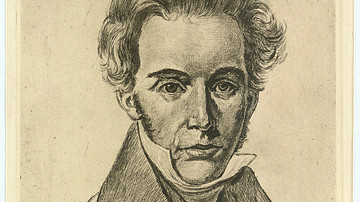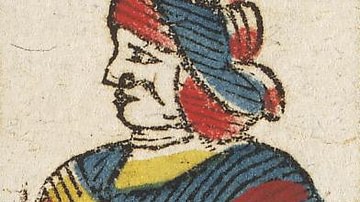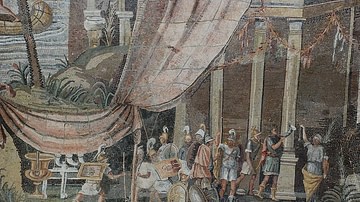Search Definitions
Browse Content (p. 30)

Definition
Ptolemy of Mauretania
Ptolemy of Mauretania (r. 23-40 CE) was king of Mauretania and one of the last surviving members of the Ptolemaic dynasty. His father Juba II (c. 48 BCE to 23 CE) was a Numidian royal and his mother Cleopatra Selene II (40 to c. 5 BCE) was...

Definition
Søren Kierkegaard
Søren Kierkegaard (1813-1855) was a Danish philosopher and is considered to be the first existentialist, influencing such notable philosophers as Jean-Paul Sartre (1905-1980) and Martin Heidegger (1889-1976). His works are a reflection of...

Definition
John Paul Jones
John Paul Jones (1747-1792) was a Scottish-born sailor who served in the Continental Navy during the American Revolutionary War (1775-1783). His raid on the English port town of Whitehaven in 1778 and his victory over the HMS Serapis the...

Definition
Ptolemaic Navy
Ptolemaic Egypt was a naval power that exerted influence throughout the Eastern Mediterranean from its foundation in 330 BCE until Cleopatra's defeat by Augustus at the Battle of Actium in 30 BCE. The Ptolemaic Kingdom produced some of the...

Definition
Little Crow (Eastman's Biography)
Little Crow (Taoyateduta, also known as Little Crow III, l. c. 1810-1863) was a Dakota Sioux chief best known as the leader of the Mdewakanton Dakota (Santee) Sioux during the Dakota War of 1862. After years of trying to maintain peaceful...

Definition
Frodi
Frodi (Old Icelandic: Fróði) is the name of legendary Danish kings in Norse mythology. There is a whole range of kings bearing the same name, pointing to fascinating traditions in both Old Icelandic and continental Germanic storytelling...

Definition
John André
Major John André (1750-1780) was a British military officer who served in the American Revolutionary War (1775-1783). He is best known for negotiating with the American turncoat Benedict Arnold, who offered to hand over the stronghold of...

Definition
Ptolemaic Army
The army of Ptolemaic Egypt was a well-organized fighting force trained in Hellenistic warfare. The Ptolemaic dynasty used their considerable wealth to maintain a large standing army of professional soldiers. Some troops were paid in money...

Definition
Benedict Arnold
Benedict Arnold (1741-1801) was a general of the Continental Army during the American Revolutionary War (1775-1783). He was considered one of the finest Patriot military officers during the early years of the conflict but defected to the...

Definition
American Revolutionary War
The American Revolutionary War (1775-1783), or the American War of Independence, was a conflict between Great Britain and its 13 North American colonies, who declared independence as the United States of America. Initially a rebellion within...